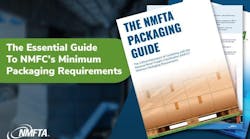From a single-truck operation to something just a little more 20 years later, McMahon Transport Group has used some good, old-fashioned American ingenuity to find success.
The Lockport, IL, petroleum hauler now runs 20 tractors hauling 20 Heil and LBT tankers to meet its growing business needs in and around the Chicago area. But back in 1990, McMahon, founded by James L. McMahon with his son John, was a far cry from the 50-person operation it is today.
That simple operation, which began with a single Peterbilt tractor, added its first true employee three years later along with a brand-new truck, and has never looked back.
Today, McMahon hauls “pretty much” any fuel, including gasoline, biofuels, diesel, jet fuel, racing fuel and kerosene. The company, which purchased 10 new tractors last year — six Peterbilts and four Macks — is the exclusive hauler for Texor Petroleum and holds contracts with many more companies. Delivery sites include gas stations, O'Hare International and Midway International Airports, and City of Chicago facilities.
McMahon runs two shifts each day, moving about 6 million gallons of fuel a week. Each tractor runs about 100,000 mi. a year to customers in the Greater Chicagoland area along with some in Northwest Indiana. The company does not buy used equipment either, trading in its trucks every 500,000 to 700,000 mi. for new equipment.
“We always want [the trucks] to stay on the road,” John McMahon, vice president and now co-owner with his brother James P. McMahon, says of the reason to only buy new. Their father is still involved as president, spending his time with customers and drivers.
McMahon feels the company's real success comes from the decision to embrace technology. Each truck is equipped with a Symbol handheld computer and Zebra printer so drivers can remain in contact with dispatchers. The printer allows for printed delivery orders to be sent to the driver, eliminating human error and/or miscommunication.
But handhelds were just the start of the computerized success for McMahon Transport. Way back in 1999, John McMahon believed the company needed a computerized dispatch system. That first system has gone through three subsequent incarnations to become a web-based program called Digital Fuel Solutions.
“After I saw what this [program] did for us, I sold it to others in the Chicago area, and now it's in, I think, four different states,” John McMahon says.
The system is fairly simple, yet quite complex. It taps into the inventory levels of customers and pulls that information into McMahon's database. After a few computer calculations, the system determines when the next delivery is needed and schedules that delivery. Dispatchers used to spend three hours a day doing the same work, John McMahon says.
It also allows distributors to view gallons and manifest numbers for every delivery; to stop deliveries to delinquent accounts with a simple click; and to generate reports. Gas station owners benefit as well by being able to see their delivery status on the web; to retrieve necessary reports; or to place an order online.
The system handles payroll, billing, and load generation and despite having more than 500 gas stations on the system, does not require any human interaction. The system can handle the tasks that previously required four employees, helping McMahon Transport save $3,800 a week.
“I knew that I would never have a life if I didn't have a system that could do my job for me,” John McMahon jokes.
And that system has helped McMahon Transport Group thrive where others have failed.


